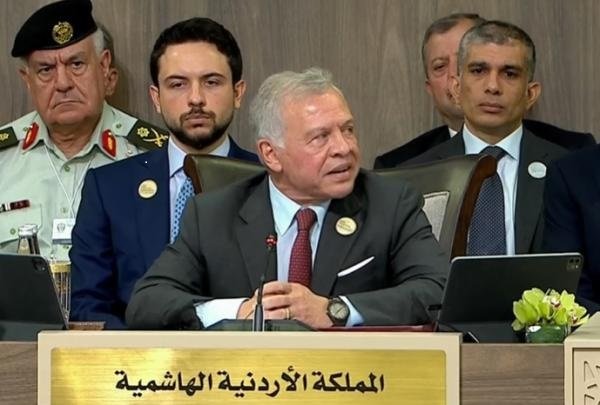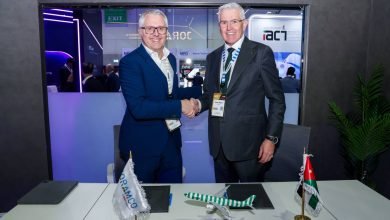
Jordan Daily – His Majesty King Abdullah II on Tuesday stressed that Gazans are facing death and devastation that have far surpassed any conflict in over twenty years, stressing that humanitarian access cannot wait for a ceasefire and cannot be subject to the political agendas of any party.
“The people of Gaza are not looking to us for platitudes and speeches. They want action. And they need that now,” His Majesty said at the plenary session of the “Call for Action: Urgent Humanitarian Response for Gaza” conference, attended by His Royal Highness Crown Prince Al Hussein bin Abdullah II.
The King continued that, “the international humanitarian response in Gaza has been severely lacking, with the delivery of aid facing obstacles at every level.”
Following is the full text of His Majesty’s remarks:
“In the Name of God, the Compassionate, the Merciful
President Abdel Fattah Al Sisi,
Mr. Secretary-General,
President Mahmoud Abbas,
Your Royal Highnesses and Excellencies,
My friends,
Let me start by thanking Their Excellencies President Abdel Fatah Al Sisi and Secretary-General Guterres for co-hosting this vital conference with Jordan.
We stand today at a critical juncture in human history. Our collective consciousness is being tested by the unfolding catastrophe in Gaza. Our very humanity is on the line.
For eight relentless months, the people of Gaza have been suffering from death and devastation that have far surpassed any conflict in over twenty years. The spectre of famine looms large. Trauma is ever-present, the effects of which will remain for generations. And every corner of Gaza is marred by ruin.
The onset of the Rafah military operation has worsened an already dire situation. Nearly one million Gazans have been again forcibly displaced, and deprived of access to food, water, shelter, and medicine. Even those displaced time and again seeking safety are targeted. No place is safe.
My Friends,
The international humanitarian response in Gaza has been severely lacking, with the delivery of aid facing obstacles at every level. Humanitarian access cannot wait for a ceasefire and cannot be subject to the political agendas of any party.
The people of Gaza are not looking to us for platitudes and speeches. They want action. And they need that now.
As we gather here today with so much at stake, our immediate focus must go to four paramount issues.
First, there is a need for a robust mechanism for coordination that engages all parties on the ground. Effective and comprehensive de-confliction between the actors on the ground is key to ensure aid agencies can act, organise, and perform their duties safely, sufficiently and sustainably.
Second, the land corridor is the most effective method for aid to flow into Gaza. International resources are critically needed to undertake this urgent endeavour. We must be ready now to deploy a sufficient number of trucks to deliver aid on a daily basis. Hundreds of trucks are needed within Gaza. And many more are needed to effectively operate a sustained flow of assistance through the land routes to Gaza. We cannot wait months to mobilise these resources for action. What we have today is simply far from what we need.
Nevertheless, Jordan will continue sending assistance, along with international organisations and donors, by land, despite the impediments. It will also continue its airdrop operations, and will consider opportunities to use heavy-lift helicopters to deliver aid, for the short term, and once there is a ceasefire.
Third, the quantity and quality of aid to Gaza is key and is equally important. Medicine, water, and shelter material should be delivered sufficiently and freely.
We must ensure there are adequate stockpiles to deploy aid without delay, as soon as we can ramp up the relief operations.
Finally, I want to draw everyone’s attention to the dire economic, political and security situation in the West Bank, where hundreds of children have been killed and injured, while settler attacks, settlement expansion, economic sanctions, restrictions to movement of people, and violations of Muslim and Christian holy sites in Jerusalem, are at their worst.
Jordan has already started sending assistance to the West Bank months ago to support the Palestinian population in these dire conditions. We have provided over $25 million of food and medical aid since October 7th to the West Bank. And a Jordanian army field hospital is operating in Nablus. This is in addition to almost $75 million in direct Jordanian assistance to Gaza since the war began, where we also operate two medical field hospitals in the north and the south.
And here again, we must warn that without the action of everyone present today, West Bank tensions could escalate into a larger conflict that will leave a far more devastating impact on the region.
My Friends,
We cannot abandon Gaza. It should be everyone’s priority. History will judge us by our actions. It is a test of our humanity and sincerity.
Thank you.”
The Jordanian delegation at the high-level conference included His Royal Highness Prince Rashid bin El Hassan, chairman of the board of trustees of the Jordan Hashemite Charity Organisation, Prime Minister Bisher Khasawneh, Deputy Prime Minister and Foreign Minister Ayman Safadi, Director of the Office of His Majesty Jafar Hassan, Chairman of the Joint Chiefs of Staff Maj. Gen. Yousef Hneiti, and General Intelligence Department Director Maj. Gen. Ahmad Husni.
The conference is co-organised by Jordan, Egypt, and the United Nations, at the invitation of His Majesty, Egypt President Abdel Fattah Al Sisi, and UN Secretary General António Guterres.
The conference, held at the level of heads of state and government, as well as heads of organisations at the King Hussein bin Talal Convention Centre, sought to identify means to bolster the international community’s humanitarian response in Gaza.
It is also aims at identifying the steps needed to ensure an active response in Gaza, as well as outlining operational and logistical needs, and committing to a unified humanitarian response.

